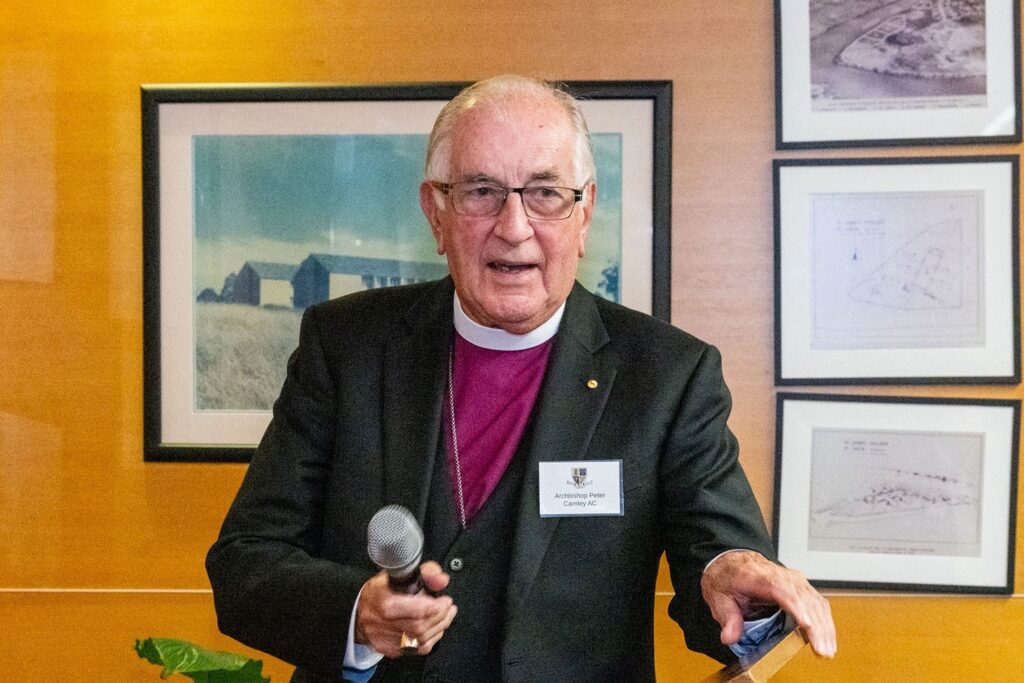
Peter Carnley
3 November 2024
Pope John Paul II once observed that ‘the modern ecumenical movement is the world’s most important peace movement’. Certainly, at the time of its origin at the end of the First World War many Christians shared the pressing awareness that they had a clear responsibility to make the most positive contribution possible to the cause of world peace. The moral imperative to help ensure that the devastating catastrophe of world war would never happen again was obvious.
With this goal firmly in view, as early as 1920 the Eastern Orthodox churches proposed the formation of some kind of international ‘fellowship of churches’ similar to the League of Nations.
Somewhat ironically, the inauguration of the World Council of Churches, which about 100 member churches had agreed to set up in 1937/38, had to be postponed because of the outbreak of World War II!
It was not until 1948 that the WCC finally came into existence. This international fellowship now comprises some 352 national or regional churches.
From the start, however, the Council suffered from the major defect that the Roman Catholic Church stood aloof from it, and even tended to regard it with suspicion. This is not to say there were not voices within the Roman Catholic fold that earnestly expressed a desire to pursue the cause of Christian unity.
Also in near proximity to the end of the First World War, Pope Pius XI explicitly approved conversations with the Anglicans that were held at Malines in Belgium between 1921 and 1926.
Successive Popes encouraged prayers for unity, and were supportive in particular of the ‘Week of Prayer for Christian Unity’. Pope Pius XII went a step further in an Instruction of 1950 in which he expressly supported the ecumenical movement, emphasizing that it originated in the action of the Holy Spirit.
Read more: Christians must aim for unity to uphold peace: World Council of Churches leader
However, there was a sense in which, from the perspective of Rome, the goal of unity was imagined only in terms of the return to Rome of the Orthodox churches of the East and, in the West, the return of those who had departed in the course of the 16th-century Reformation.
It was not until John XXIII called the Second Vatican Council which began its work in 1962 that things began to change dramatically.
On 21 November 1964 the Council promulgated its Decree on Ecumenism, Unitatis Redintegratio, which stands as one of the most momentous events of the twentieth century.
Those of us who were alive at the time will remember something of the excitement that reverberated around the world when Unitatis Redintegratio passed in the Council by an overwhelmingly positive vote of 2137 bishops in favour, with only 11 in opposition.
This decree brought the Roman Catholic Church formally into the ecumenical movement as a key player by signalling an unqualified commitment to the search for Christian unity. Indeed, in its opening statement it declared that the restoration of unity among all Christians was one of the principal concerns of the Second Vatican Council.
The document states in its introduction that, “Christ the Lord founded one Church and one Church only”, and forthrightly declares that division contradicts the will of the Lord, “scandalizes the world and damages …the preaching of the Gospel.”
Read more: Labyrinth walk will focus on world peace
Certainly, the text of Unitatis Redintegratio breathed a new generosity of spirit. It forthrightly reversed a long-held Roman Catholic position effectively of claiming to be the only true Church of Jesus Christ. This was achieved by openly affirming the validity of baptisms administered by other Christian churches and ecclesial bodies.
Then, instead of claiming that the Roman Catholic Church simply is the Church of Jesus Christ, a follow-up Vatican II document on the Church, Lumen Gentium, affirmed that the Church of Jesus Christ “subsists in” the Roman Catholic Church – without denying that in varying degrees it subsists in other churches and ecclesial bodies which validly offer salvation in Christ to their adherents.
In 1969 the unequivocal ecumenical commitment of Unitatis Redintegratio was put into practice when the Pontifical Council for Promoting Christian Unity was set up as a permanent Vatican department. Clearly, ecumenically speaking the Roman Catholic Church really meant business. Soon after, with the generous help of the Doria family, the Anglican Communion responded by establishing a permanent diplomatic presence – the Anglican Centre in Rome.
Multiple unilateral dialogues then systematically addressed issues that were identified as having previously been contentious and divisive across the Christian spectrum. Individualised dialogues were established between Rome and the Orthodox churches, the Anglican Communion, the World Lutheran Federation, the Reformed churches and Pentecostal churches.
In deepening relations with the Anglican Communion, in the decade between 1971 and 1981 the Anglican-Roman Catholic International Commission produced agreed statements and “elucidations” on the eucharist, ministry and ordination, and the exercise of authority in the Church.
A second phase of this dialogue addressed salvation (1987), the Church as Communion (1991), morals (1994), and in 2006 reached agreement in an irenic and deeply spiritual document Mary, Grace and Hope in Christ, on the place of Mary in the theology and devotion of the Church. It even proposed an enlightening, agreed understanding of the formerly divisive Vatican dogmas of the Immaculate Conception (1854) and Bodily Assumption of the Blessed Virgin Mary (1950).
Clearly, when measured in terms of this output of agreed statements, the flow-on effect of the Vatican Decree on Ecumenism of 21 November 1964 has been enormous.
Read more: Christians urged to push for lasting peace in Gaza
Understandably, the 60th anniversary of the Decree is to be celebrated with gusto at St George’s Anglican Cathedral Perth on Sunday 10 November when current Anglican Archbishop, Kay Goldsworthy will preside at a commemorative Evensong, at which her Catholic counterpart, Archbishop Timothy Costelloe will preach the sermon. An appropriate party is planned outside the cathedral afterwards.
The date of this celebration was chosen with the consideration of predominating practicalities in mind, given the need to find space in busy diaries as close to the actual date of the 60th anniversary as possible.
However, by a stroke of providence 10 November falls on the eve of Armistice Day, thus happily reviving the original connection with the theme of world peace that provided the initial stimulus for the twentieth century ecumenical movement in the first place.
Alas, perhaps at this time in the history of this tragically divided and troubled world, the churches may take the opportunity to expand their vocation to work together so as, at the very least, to uphold the possibility of dialogue before their sister world religions of the tradition of Abrahamic monotheism – Judaism and Islam.
World peace is once again a moral imperative.
The Most Reverend Dr Peter Carnley was Anglican Archbishop of Perth from 1981 to 2005, and primate of the Australian Anglican Church from 2000 to 2005.
For more faith news, follow The Melbourne Anglican on Facebook, Instagram, or subscribe to our weekly emails.







